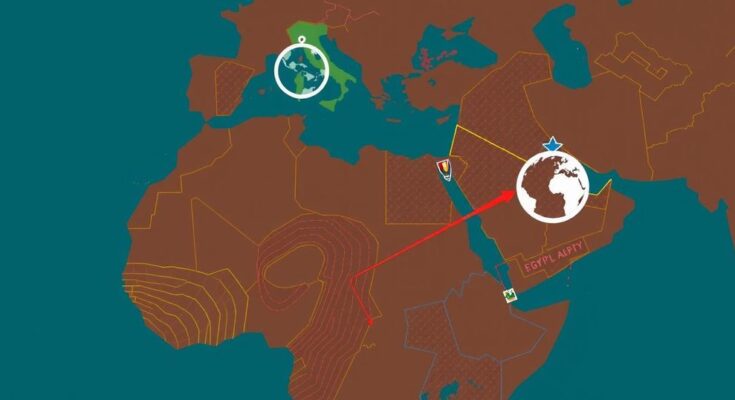The recent Egypt-Eritrea-Somalia summit in Asmara signals a significant shift in the Horn of Africa’s geopolitics, primarily targeting Ethiopia. Amid security challenges, the summit aimed to strengthen cooperation among its members, yet deeper motives suggest a concerted effort to encircle Ethiopia in light of ongoing tensions over water resources and territorial disputes, particularly concerning Somaliland.
The recent summit convened in Asmara, Eritrea, involving Egypt, Eritrea, and Somalia, marks another significant turning point in the geopolitical landscape of the Horn of Africa, a region historically marked by unrest and rivalry. The stated aim of this trilateral gathering was to foster collaboration in light of ongoing regional security challenges. However, underlying this initiative is a concerted effort to encircle Ethiopia, whose influence and actions remain contentious. During the summit, which included leaders such as Isaias Afwerki of Eritrea, Abdel Fattah al-Sisi of Egypt, and Hassan Sheikh Mohamud of Somalia, discussions primarily revolved around enhancing cooperation and asserting regional autonomy. The joint statement highlighted the commitment of the participating nations to uphold territorial integrity and resist foreign interference. The Horn of Africa is characterized by intricate alliances and historical grievances, often placing Ethiopia at the center of these dynamics. A contested agreement between Ethiopia and Somaliland regarding access to key ports has stirred tensions, particularly with Somalia, which continues to reject the recognition of Somaliland’s independence since its split in 1991. Somalia’s military agreement with Egypt signals a growing security partnership, aimed at fortifying Somalia against the al-Shabaab insurgency, while simultaneously diluting Ethiopia’s influence. Ethiopia’s tensions with Egypt stem from the Grand Ethiopian Renaissance Dam, seen by Cairo as a direct threat to its water resources. Although Ethiopia’s actions have not been explicitly mentioned in summit discussions, it is evident that concerns regarding it fuel the coalition’s dynamics. Egypt perceives the dam’s filling as exacerbating threats, prompting it to solidify alliances that may position it for conflict. Furthermore, Eritrea, known for its isolationist policies under Afwerki’s regime, seeks to enhance its stature as a regional power, particularly given its strategic geographical position near the Bab el-Mandeb Strait. Its agreement with Egypt augments its role in regional stability and provides a counterbalance to Ethiopia’s influence. The summit indicates a potential reassessment of power relations within the Horn of Africa, suggesting a shift in allegiance toward military cooperation among Egypt, Eritrea, and Somalia, potentially at the expense of Ethiopia. While both the cooperation ostensibly aims to stabilize the region, underlying motivations may incite further instability. Egypt’s involvement, although lacking direct geographic ties, reflects its desire to maintain dominance and mitigate perceived threats from Ethiopia. The joint ventures between these nations may give rise to increased aggression and unrest, heightening Ethiopia’s security concerns, especially within the context of ongoing regional strife. Consequently, Ethiopia finds itself at a crossroads, needing to engage diplomatically with both neighboring nations and global actors to navigate these intricate dynamics successfully.
This article discusses the shifting geopolitical alliances in the Horn of Africa, specifically focusing on the recent summit involving Egypt, Eritrea, and Somalia. It outlines how these alliances are primarily aimed at encirclement and counteraction against Ethiopia, which has become a focal point of regional geopolitical tensions due to issues such as the Grand Ethiopian Renaissance Dam and the ongoing crisis with Somaliland. The complexities of Ethiopian relations with its neighbors, including historical grievances and contemporary diplomatic challenges, underpin the evolving alliances.
The dynamics in the Horn of Africa are increasingly characterized by shifting alliances, particularly as Egypt, Eritrea, and Somalia come together to form a coalition that presents a united front against Ethiopia. The underlying motives for this alliance suggest increased tension rather than stabilization, particularly in light of unresolved issues concerning water politics and territorial disputes. Ethiopia must pursue a strategic diplomatic approach not only to manage its relationships with these nations but also to secure the support of international actors to navigate the complex geopolitical landscape effectively.
Original Source: thehill.com




